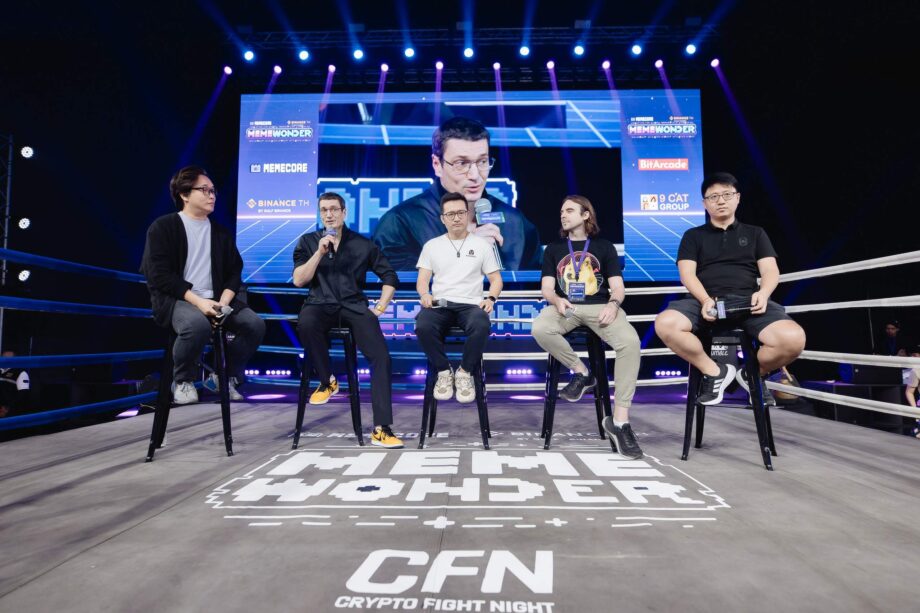The Memewonder event, co-hosted by Binance Thailand and MemeCore, brought together industry leaders to discuss the evolving landscape of memecoins. This panel, part of the Thailand Blockchain Week 2024, featured insights from key figures in the blockchain and cryptocurrency space. The discussion, moderated by Anndy Lian, a best-selling author and Managing Director of LIFT Ecofund by MemeCore, delved into the trends, challenges, and future of memecoins, particularly focusing on Community Takeover (CTO) projects.
Key Themes and Insights
The Rise of Community Takeover (CTO) Projects
Anndy Lian started off by saying that CTO projects are gaining popularity due to their community-driven nature. Unlike traditional projects led by developers, CTOs empower communities to take charge, fostering a sense of ownership and engagement. This model aligns with the decentralized ethos of blockchain, where communities can drive projects forward without relying on centralized leadership.
Jordan Jefferson, CEO of MyDoge, provided insights from the Dogecoin community, the original CTO project. He highlighted the narrative appeal of CTOs, where communities take over projects from anonymous developers. Jefferson pointed out that while CTOs offer a compelling narrative, they face challenges such as funding and coordination. He emphasized the need for sustainable models and investable opportunities within the Dogecoin ecosystem, aiming to attract more developers and projects to build on Dogecoin.
Challenges and Risks of CTO Projects
Despite their appeal, CTO projects face significant challenges. Anndy Lian highlighted issues such as fragmented communities, lack of funding, and the need for strong leadership. Without adequate resources and coordination, CTO projects risk failing, leading to the demise of the project. The panelists stressed the importance of sustainable models and the need for communities to secure funding and liquidity to thrive.
Louis Bellet, CEO & Fonder, Yellow, replied to the comment by highlighting the role of Yellow in decentralizing finance. He emphasized the importance of community-driven projects, noting that developers often lack the skills to build strong communities. Bellet argued that memecoins should naturally transition to community leadership, where new leaders emerge from within the community to drive the project forward. He also mentioned Yellow’s market-making division, which has been approached by several CTO projects for token listings, underscoring the growing interest in community-led initiatives.
The Role of Memecoins in the Broader Blockchain Ecosystem
Memecoins, often seen as speculative assets, have the potential to drive innovation and engagement in the blockchain space. The panelists discussed the entertainment value of memecoins, likening them to cultural phenomena that capture public imagination. They also noted the potential for memecoins to integrate with real-world applications, such as mobile apps and merchandise, to enhance their utility and appeal.
Eddie Li, Co-founder, AEON, shared his perspective as a payment protocol provider, focusing on the consumer attraction of memecoins. He noted that memecoins, driven by community and financial incentives, are gaining traction where traditional projects struggle. Li emphasized the importance of facilitating payments across different chains to support memecoin adoption. He also expressed concerns about the sustainability of memecoins, cautioning against projects with weak narratives or visions.
Future Trends and Innovations
Looking ahead, the panelists identified several trends that could shape the future of memecoins. They anticipated more innovation in fair launches and community involvement, with projects exploring new ways to engage and reward their communities. The panelists also highlighted the potential for memecoins to collaborate with traditional businesses, leveraging their community-driven nature to create new opportunities and partnerships.
Allan Fang, Partner, Blockchain for Good Alliance and Head of Moledao added that education is important. He stressed the importance of community support and governance in building strong projects. Fang noted that memecoins offer a unique way to engage communities, likening them to totems that foster loyalty and engagement. He also highlighted the potential for memecoins to link with real-world brands, suggesting that they could serve as effective community management tools.
Conclusion
The Memewonder panel discussion provided valuable insights into the evolving landscape of memecoins. As the blockchain industry continues to grow, memecoins are poised to play a significant role in driving innovation and community engagement. However, their success will depend on the ability of communities to navigate the challenges of funding, leadership, and sustainability. By fostering strong communities and exploring new applications, memecoins can continue to thrive and contribute to the broader blockchain ecosystem.

Anndy Lian is an early blockchain adopter and experienced serial entrepreneur who is known for his work in the government sector. He is a best selling book author- “NFT: From Zero to Hero” and “Blockchain Revolution 2030”.
Currently, he is appointed as the Chief Digital Advisor at Mongolia Productivity Organization, championing national digitization. Prior to his current appointments, he was the Chairman of BigONE Exchange, a global top 30 ranked crypto spot exchange and was also the Advisory Board Member for Hyundai DAC, the blockchain arm of South Korea’s largest car manufacturer Hyundai Motor Group. Lian played a pivotal role as the Blockchain Advisor for Asian Productivity Organisation (APO), an intergovernmental organization committed to improving productivity in the Asia-Pacific region.
An avid supporter of incubating start-ups, Anndy has also been a private investor for the past eight years. With a growth investment mindset, Anndy strategically demonstrates this in the companies he chooses to be involved with. He believes that what he is doing through blockchain technology currently will revolutionise and redefine traditional businesses. He also believes that the blockchain industry has to be “redecentralised”.




